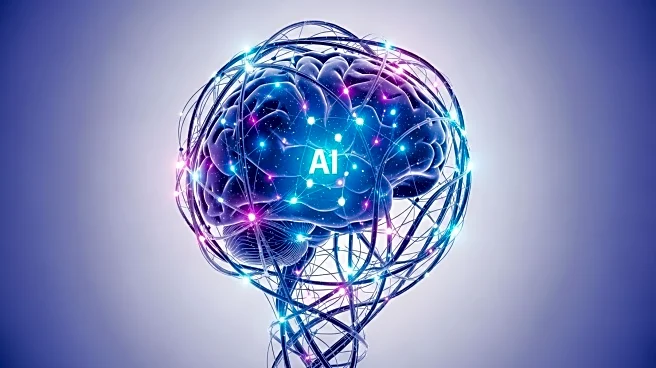What is the story about?
What's Happening?
A study conducted by researchers at the University of California, Los Angeles (UCLA) has revealed significant similarities in how biological brains and artificial intelligence systems develop cooperative behaviors. The research involved observing mice and AI agents as they coordinated actions to achieve shared goals. Both systems independently developed similar behavioral strategies and neural representations, suggesting fundamental principles of cooperation that transcend the boundaries between biology and technology. The study utilized advanced calcium imaging technology to record brain activity in mice, while AI agents were trained using multi-agent reinforcement learning in a virtual environment.
Why It's Important?
Understanding cooperation is crucial for human society, impacting everything from workplace teamwork to international diplomacy. The findings from UCLA's study have profound implications for addressing social conflict and designing better AI systems. By identifying shared neural mechanisms, the research opens new possibilities for understanding cooperative behavior in artificial agents and its resemblance to biological systems. This knowledge could lead to advancements in AI that enhance collaborative capabilities, potentially benefiting industries reliant on teamwork and cooperation. Additionally, insights into social behavior disorders could emerge, offering new avenues for treatment.
What's Next?
The research team plans to explore whether similar neural mechanisms exist in other brain regions involved in social behavior. They aim to understand how these principles can advance broader knowledge of social behavior development and function. The parallels between biological and artificial systems suggest that studying animal cooperation could inform the design of more sophisticated AI systems. Furthermore, AI models may help test hypotheses about brain function that are challenging to examine in living animals, potentially leading to breakthroughs in neuroscience and AI development.
Beyond the Headlines
The study highlights ethical considerations in AI development, particularly in creating systems that mimic human social behaviors. Understanding cooperation at a neural level could lead to AI systems that better integrate into human environments, raising questions about the ethical use of such technology. Long-term, this research could influence cultural perceptions of AI, shifting views from seeing AI as purely functional tools to recognizing them as entities capable of complex social interactions.















